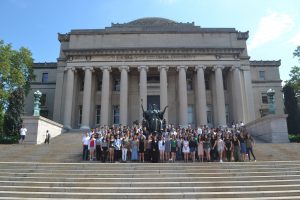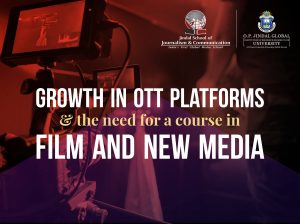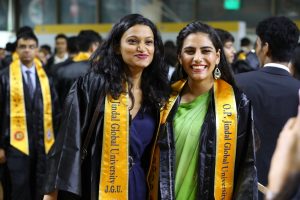In today’s fast-paced world, information plays a vital role in shaping our perspectives and beliefs. The media has emerged as a powerful tool that not only informs us but also influences our thoughts and actions. With the advent of social media, the line between fact and fiction has blurred, making it increasingly important for responsible journalism to take center stage. If you’re someone who wants to uncover stories that matter and make a difference in society, then a career in journalism and media studies may be the right choice for you.
What are Media Studies?
Before we dive deeper into why studying journalism and media studies at O.P. Jindal Global University (JGU) is a great idea, let’s first understand what media studies entail.
Media studies is an interdisciplinary field that examines the content, history, and effects of various media forms such as television, radio, film, the press, and the internet. It explores how these mediums shape our society, culture, and politics. Media studies also involves analyzing the impact of technology on communication and how it affects the way we consume and interact with information.
Why Study Journalism in JGU?
If you’re considering a career in journalism and media studies, look no further than JGU’s Bachelor of Arts (BA) program in Journalism and Media Studies. This program offers a unique combination of theoretical knowledge and practical skills that will equip you to navigate the rapidly changing media landscape. The curriculum is carefully crafted to provide students with a deep understanding of media ethics, laws, and technical aspects of journalism.
At JGU, you’ll learn from experienced faculty members who are experts in their respective fields. They bring years of experience in journalism and media studies, providing valuable insights and mentorship throughout your academic journey. Our state-of-the-art infrastructure includes modern studios, editing suites, and equipment that allow you to hone your skills in a real-world setting.
Reasons Why You Should Pursue a Career in Media Studies in India
India is a land of diversity, with a rich cultural heritage and a vibrant democracy. The media landscape in India is equally diverse, offering a wide range of opportunities for aspiring journalists and media professionals. The benefits of media studies are manifold, including the development of critical thinking, research skills, and the ability to articulate complex ideas effectively.
Here are some reasons why you should consider a career in media studies in India:
- Dynamic Media Landscape: India’s media landscape is constantly evolving, with new technologies and platforms emerging every year. This creates a need for skilled media professionals who can adapt to changes and tell compelling stories across multiple channels.
- Diverse Culture: India’s diverse culture provides a wealth of stories waiting to be told. From investigating corruption scandals to covering local elections, there’s never a shortage of interesting topics to cover.
- Growing Demand for Content Creators: With the rise of digital media, the demand for high-quality content creators has increased significantly. Whether it’s creating engaging videos for social media or developing thoughtful articles for online publications, media studies graduates are in high demand.
- Opportunity to Make a Difference: A career in journalism and media studies allows you to influence public discourse and effect positive change in society. By uncovering stories that matter, you can help bring attention to important issues and promote justice and equality.
- Exciting Career Paths: A degree in journalism and media studies opens up many career paths, including print, electronic, and digital media. You can work as a journalist, editor, producer, content writer, or even start your own media outlet.
- Hands-on Learning Experience: At JGU, you’ll have access to state-of-the-art recording studios, editing suites, and multimedia labs that simulate real-world media environments. You’ll gain hands-on experience in producing, directing, camera operation, and editing, which will help you develop the practical skills needed to succeed in the industry.
- Industry Connections: JGU has established partnerships with leading media organizations, providing students with opportunities to intern and work on live projects. These connections open doors to networking possibilities and give you a head start in building your professional portfolio.
By joining the BA in Journalism and Media Studies program at JGU, you can start an exciting journey that prepares you for a fulfilling career in the media industry. With its unique blend of theoretical knowledge, practical training, and industry exposure, JGU sets the stage for your success. Apply now and begin your journey to uncovering stories that matter!
Major Career Fields in Journalism and Media Studies
A degree in journalism and media studies opens up a wide range of career options, beyond traditional newsroom roles. Graduates can explore career paths in broadcasting, digital media, public relations, content writing, and more. The digital age has created a demand for versatile media professionals who can tell compelling stories across multiple platforms. The benefits of BA Journalism extend beyond traditional newsrooms, as the digital age demands versatile media professionals adept at storytelling across platforms.
Some of the major career fields in journalism and media studies include:
- Broadcasting: Graduates can pursue careers in television, radio, and podcasting, working as reporters, anchors, producers, or editors.
- Digital Media: With the rise of online media, there is a growing demand for content creators, social media managers, and digital strategists. Graduates can work in digital publishing, advertising, or marketing, creating engaging content for various platforms.
- Public Relations: Public relations specialists work with clients to build and maintain their reputation, creating press releases, media kits, and other promotional materials. They may also work in crisis communications, helping organizations manage negative publicity.
- Content Writing: Graduates can work as freelance writers, creating content for websites, blogs, and magazines. They may also work as copywriters, crafting persuasive copy for advertisements and marketing campaigns.
- Media Analysis: Media analysts study data to understand audience behavior, track trends, and measure the impact of media campaigns. They may work in media consulting firms, ad agencies, or media companies.
Scope of Journalism in India
The scope of journalism in India is vast and ever-expanding. With the rise of digital media, there is a growing demand for content creators, editors, and media analysts. Journalism benefits include the opportunity to influence public discourse, hold power to account, and be at the forefront of societal change.
For those wondering how to get a career in journalism, a degree from JGU serves as a solid foundation, equipping students with the necessary skills and knowledge to thrive in the industry. The university’s location provides access to some of the biggest media houses and organizations in the country, offering ample opportunities for internships, networking, and career growth.
In addition to traditional newsroom roles, journalism graduates can explore career paths in corporate communications, non-profit organizations, government agencies, and educational institutions. They may also work as freelance journalists, contributing to national and international publications.
Conclusion
A career in journalism and media studies is not just about reporting news; it’s about being a custodian of truth and democracy. JGU’s BA in Journalism and Media Studies program offers the benefits of journalism, preparing students to become ethical, informed, and innovative media professionals. As the media landscape evolves, so does the role of journalists.
Today, journalists must be skilled in multi-platform storytelling, social media management, and data analysis. They must also be prepared to face challenges such as fake news, propaganda, and declining trust in the media. Despite these challenges, a career in journalism remains an exciting and rewarding choice.
With the right skills and knowledge, journalists can make a meaningful contribution to society, holding power to account and giving voice to marginalized communities. At JGU, we believe that journalism is not just a profession; it’s a calling. We aim to produce graduates who are passionate about telling stories that matter, who are committed to ethical v cjournalism practices, and who are ready to embrace the challenges of the digital age.
So if you’re looking for a career that combines creativity, curiosity, and commitment to the greater good, join us at JGU and discover the power and benefits of media studies and journalism.
OP Jindal Global University- Jindal School of Journalism and Communication
Aspiring to ignite your passion for storytelling and contribute to the ever-evolving media landscape? Look no further than O.P. Jindal Global University (JGU) and Jindal School of Journalism & Communication for their B.A. (Hons.) Journalism & Media Studies program.




